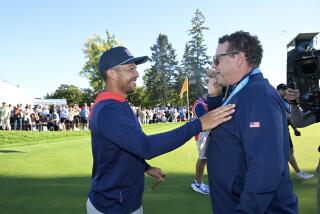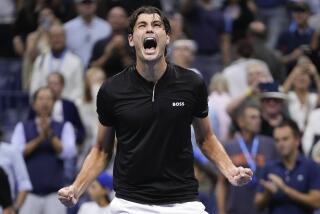Gorman Weighs Davis Cup Disaster : After Asuncion Ouster, U.S. Needs to Beat West Germany
- Share via
The Davis Cup dream--West Germany versus the United States, Mac against Boris--became a reality last weekend.
But, the reality is fairly unpleasant. The glamour match-up is nothing but a fight for consolation honors. It’s called the relegation round, which is essentially tennis’ version of the NFL’s old Playoff Bowl. Actually, there is an element of suspense as the United States must win or be banished to zone competition next year.
Well, you may ask, how did the U. S. team get there?
If Jimmy Arias hadn’t pushed a forehand long, or hit another in the net, or failed to convert his third match point, that question would be moot.
But, none of the above happened. Arias, who had fought back from a two-set deficit, fell in the fifth to obscure Hugo Chapacu on Sunday, 9-7. That evened the round at 2-2. Then, Victor Pecci clinched the match for Paraguay with a straight-set victory over Aaron Krickstein.
“I really don’t consider this an upset . . . although I’m upset about it,” said Tom Gorman, the U.S. Davis Cup captain, in a telephone interview from his home in Rancho Mirage.
From the start, Gorman asserted that Paraguay would be no pushover. The Czechs, with Ivan Lendl, lost in Paraguay in 1983. It proved to be no fluke when the French team, which included Yannick Noah and Henri Leconte, became first-round victims in 1985.
“I personally don’t view it as a setback for a couple of reasons,” Gorman said. “The other countries that lost down there are world powers in tennis. We keep telling people it’s never easy to play in South America. It’s an incredible test and not just of your tennis ability.”
Paraguay’s reputation as one of the toughest sites is well-deserved. In previous years, France and Czechoslovakia lost at Asuncion on a fast, wooden surface in a small and noisy arena. This time, though, the surface was clay at the outdoor Paraguay Yacht and Golf Club.
The crowd of 3,000 chanted after important points. And, drums and tambourines were pounded after almost every single rally. Fans also tossed pebbles and bottle caps at Arias.
“Every time Chapacu hit it on the line or sometimes a little out, it was called good,” Gorman said. “But when Jimmy hit it out, it was called out. And there were times when he (Arias) hit it on the line and it was called out. So, a lot of times when calls were changed it looked like they were ruling in favor of the U.S. But there were so many situations where he had to do it.
“I don’t want to sound like a sour-grapes story. We knew these things. We knew they had drums. We knew they had the music and singing.”
But . . .
No matter how you look at it, the United States’ failure to get past a tiny country like Paraguay does border on embarrassment.
Arthur Ashe, the Davis Cup captain before Gorman, feels that the United States had its best possible team in Asuncion, with the exception of John McEnroe. And, noting the unpredictability of Davis Cup play, the results didn’t surprise him. However, he does view it as a setback.
“Anytime you lose it’s a setback,” he said. “We’ve come back and done well, though, after setbacks. Maybe this will shock us into doing something . . . We are all concerned (about American tennis). We don’t have our heads in the sand. I don’t think it’s a cycle, either. I think the cycle theory is a load of crap.”
In assessing last weekend, Gorman looks at the Czechoslovakian loss to Israel and the West German loss to Spain as bigger upsets. However, Lendl doesn’t play for the Czechs anymore and Israel’s Amos Mansdorf is ranked No. 33. Spain’s Emilio Sanchez, ranked No. 15, was a finalist at Rome last year on clay. His teammate, Sergio Casal (who upset Boris Becker) is No. 52.
As for the Paraguayans, they don’t come much more unknown than Chapacu. The 24-year-old is No. 282 and has earned $3,953 in career prize money. With his low ranking, Chapacu has spent most of his time playing the Challenger circuit. The Assn. of Tennis Professionals (ATP) office in Arlington, Tex., doesn’t have a birth date or height and weight for Chapacu.
As for Pecci, he once reached the French Open final, losing to Bjorn Borg. But that was in 1979 and Pecci’s ranking has now dropped to 113 and he, too, plays smaller tournaments. In Davis Cup, however, Pecci has never lost a singles match in Asuncion.
“I didn’t know much about Chapacu,” Gorman said. “But I have to think this was his greatest tennis match. In a way, he caught us by surprise. We weren’t looking past him, but we did go into it with confidence.”
Now, Gorman is faced with another difficult task. The Americans need to defeat Becker and the West Germans to stay in the 1988 World Group. That round, set for July 24-26, will presumably be held on a fast indoor court or on cement outdoors.
And, hopefully, with McEnroe?
“I haven’t even had time to think about it,” said Gorman, who returned to California Tuesday.
On Wednesday, Gorman had just finished watching tapes of the matches and was still thinking about the might-have-beens.
“Before we left on Monday, someone came up to me and said this is the biggest thing that has ever happened to Paraguay,” Gorman said. “The people there will never forget this.”
He didn’t need to add the names of Jimmy Arias, Aaron Krickstein, Ken Flach, Robert Seguso and Tom Gorman to the list.
More to Read
Go beyond the scoreboard
Get the latest on L.A.'s teams in the daily Sports Report newsletter.
You may occasionally receive promotional content from the Los Angeles Times.











